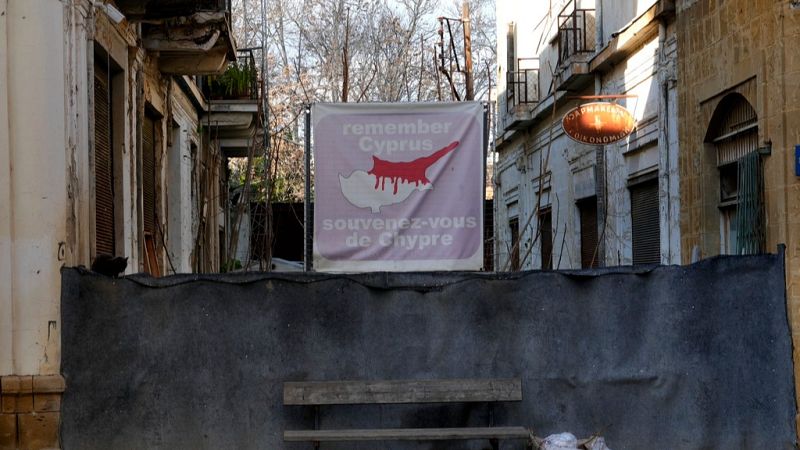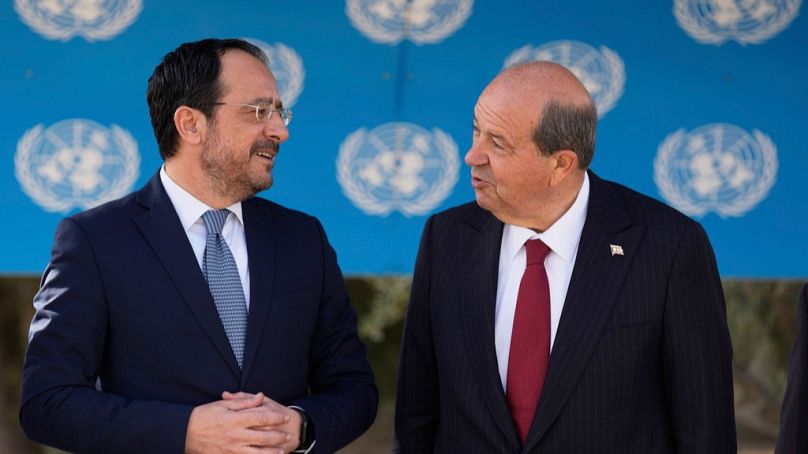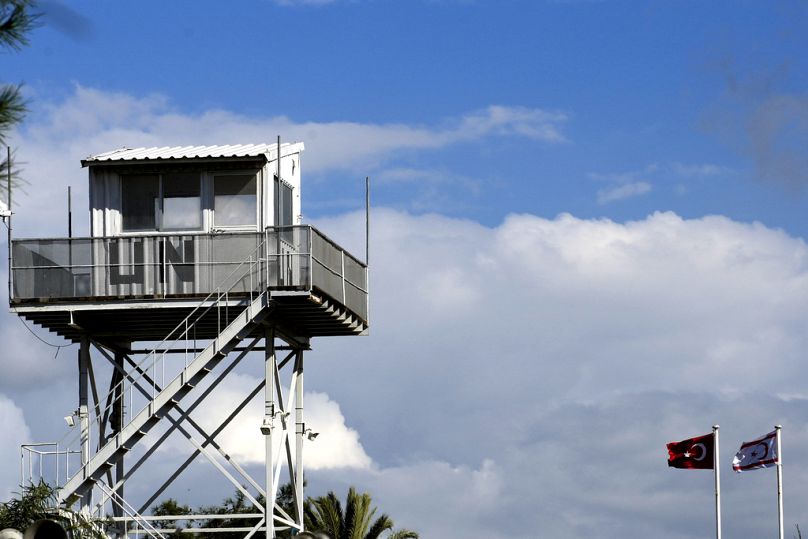
The rival leaders of ethnically divided Cyprus are meeting at the UN headquarters in New York on Wednesday to discuss the future of the island and build upon talks in March, which marked the first step toward renewed dialogue after years of deadlock.
UN spokesperson Stéphane Dujarric said the latest meeting "will provide an opportunity to continue the dialogue and exchange views on the progress made since March.
At that last meeting in Geneva, Greek Cypriot President Nikos Christodoulides and Turkish Cypriot leader Ersin Tatar agreed to trust-building measures on issues like energy, environment, youth affairs and demining, as well as opening four new crossing points along a UN-controlled buffer zone that divides the Mediterranean island.
Cyprus has been divided since 1974, when a Greek-backed coup triggered a Turkish military intervention.
This led to a split between the internationally recognised Greek Cypriot-controlled Republic of Cyprus and the self-declared entity in the north.
Only Turkey recognises the island’s breakaway state in northern Cyprus, and it maintains more than 35,000 troops in the territory.
While the Republic of Cyprus is part of the European Union, EU law does not apply in the breakaway northern entity, which remains under Turkish military presence.
Negotiations between the rivals have been stalled since 2017.

As with the meeting in March in Geneva, guarantors from Greece, Turkey and the United Kingdom will be at the two-day meeting in New York at the request of UN Secretary-General António Guterres.
Ahead of the latest talks, the Republic of Cyprus' deputy government spokesperson Yiannis Antoniou — who serves under Christodoulides — told Euronews that the Greek side's main aim was to agree on specific outcomes for the trust-building measures.
"The aim is to go to the next step, which is to create the conditions for direct negotiations," Antoniou said in an exclusive interview.
"For us, this is the most important thing. That is to go to the negotiating table in search of a comprehensive solution to the Cyprus problem," he added.
Concern over crossing points
The primary obstacle to peace is Turkey's and northern Cyprus' insistence on a two-state solution. This goes against Cyprus' desire for a federation — a model endorsed by the UN Security Council — that foresees Greek-speaking and Turkish-speaking zones.
Greek Cypriots say they won’t agree to any accord that formally partitions the island, allows for a permanent Turkish troop presence, gives Turkey rights to militarily intervene or offers the minority Turkish Cypriots a veto right on all government decisions.
The rivals have made some progress since March on the trust-building measures, which also include work on a photovoltaic park inside the buffer zone and restoration work on cemeteries on both sides of the divide.
However, the opening of four new crossing points has proved to be a sticking point.

Antoniou told Euronews that the Turkish Cypriot side had deployed a "delaying policy".
"They claim that they cannot decide for themselves and that it is a matter for the Turkish army. We cannot accept this argument," he said.
"We can't agree to the opening of just one roadblock, because there must be an element of reciprocity, that is to say, we must accept the opening of crossing points, but these must serve the inhabitants on both sides of Cyprus, in the occupied and free areas."
On the issue of the photovoltaic park within the buffer zone, Antoniou said his government objected to the Turkish Cypriot side's stance on the matter.
"The other side essentially wants this photovoltaic park to operate in the conditions of two separate sovereign states, which we will certainly not accept," he said.
'Lack of trust'
In the light of geopolitical challenges and conflicts ranging from the ouster of Bashar al-Assad in Syria to Russia's full-scale invasion of Ukraine, Turkey has increasingly positioned itself as a point of stability and powerbroker in the Middle East.
For the Greek Cypriots, this is a concern, according to Antoniou.
"We see the Turkish side, after the fall of the al-Assad regime in Syria, approaching things with more political and diplomatic arrogance," he told Euronews.
"What concerns us at the moment is that it seems that Tatar is following a delaying policy because he may be serving his own agenda due to the upcoming 'elections'," he added.
Tatar faces reelection in October and says he is running on the same two-state platform — with the backing of Ankara — that first got him elected in 2020.
Antoniou said he believed the mediators in New York intended to maintain dialogue during this meeting in the expectation that after the elections in northern Cyprus, "there may be a political environment that allows us to move forward".
"We are not expecting anything drastic in New York, or any substantial change due to the attitude of the Turkish side", he added.
In a recent interview with Politis, a daily Greek-language newspaper published in Cyprus, the UN Secretary-General's Personal Envoy on Cyprus María Angela Holguín said she was worried about "the growing gap between the two communities at a societal level".
Antoniou said that there was a lot of work to be done by both sides on this issue, although he stressed that the two very different situations should not be equated.
"For our part, as far as possible, we are trying to work creatively around these issues with respect for the rights of Turkish Cypriots and respect for religious freedoms in the free areas for all the inhabitants of the island," he said.
"Turkish Cypriots are free to come to the free areas controlled by the Republic of Cyprus and pray, visit their mosques and so on, while on the other side the same is not exactly the case. Consequently, they are two completely different worlds a lot of times, which exacerbates this feeling of lack of trust, unfortunately," Antoniou added.







